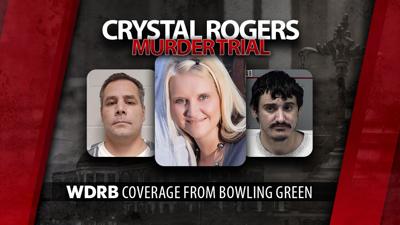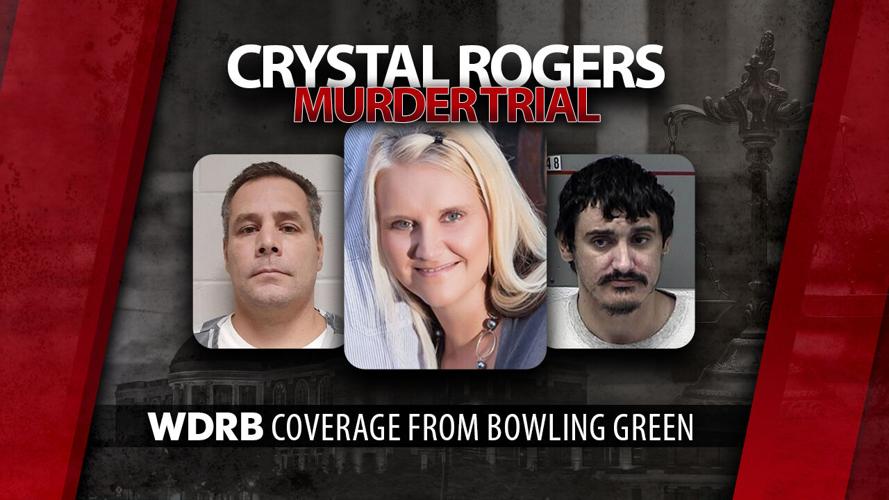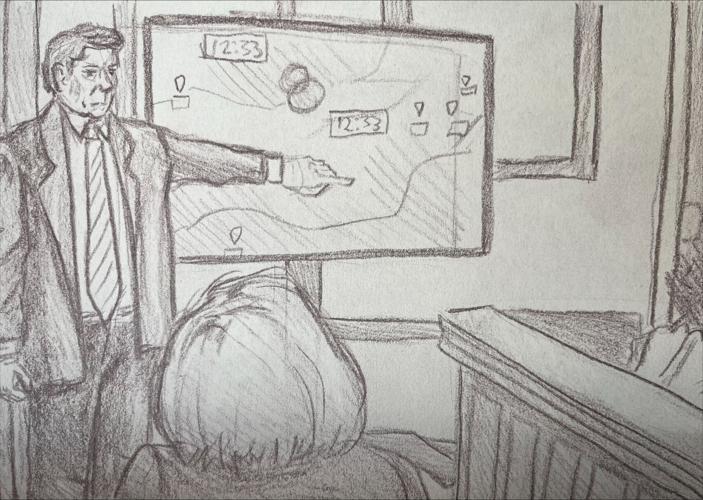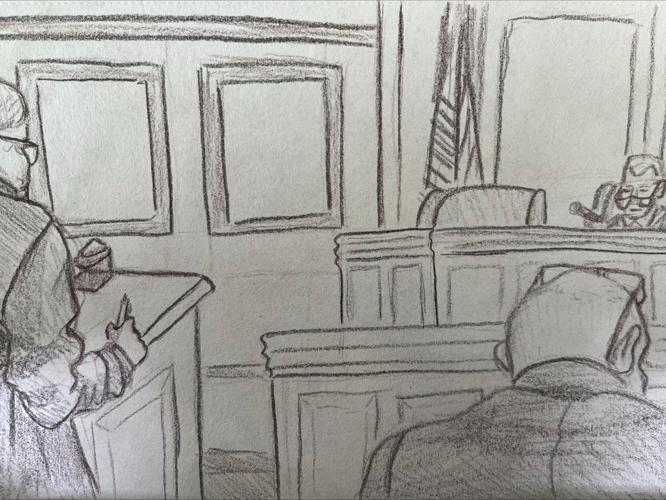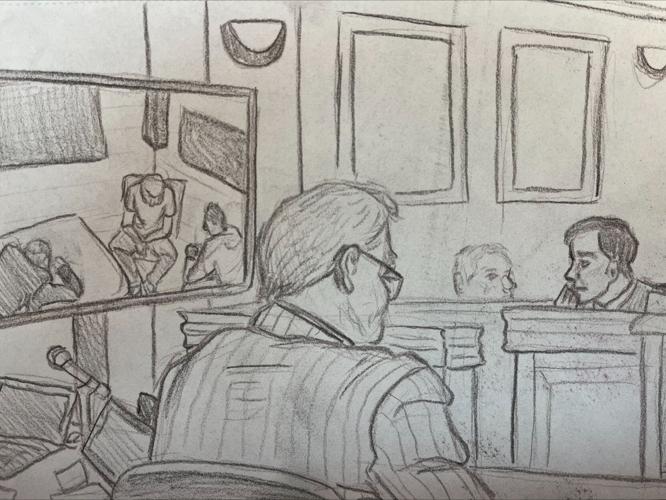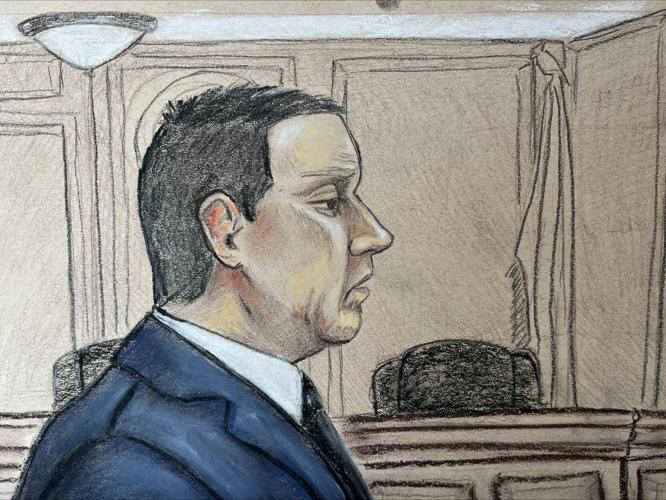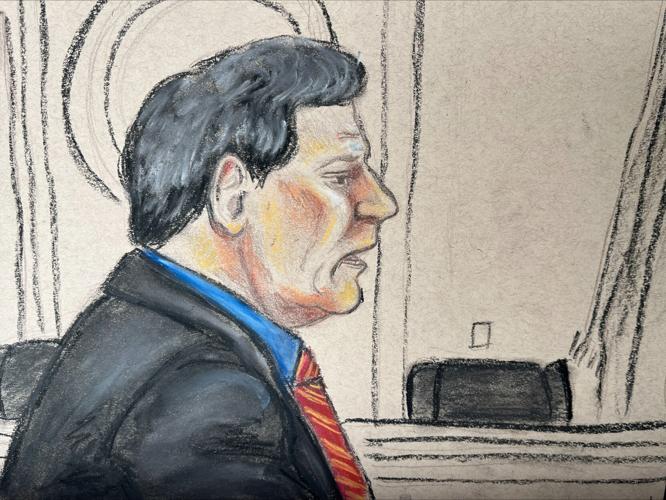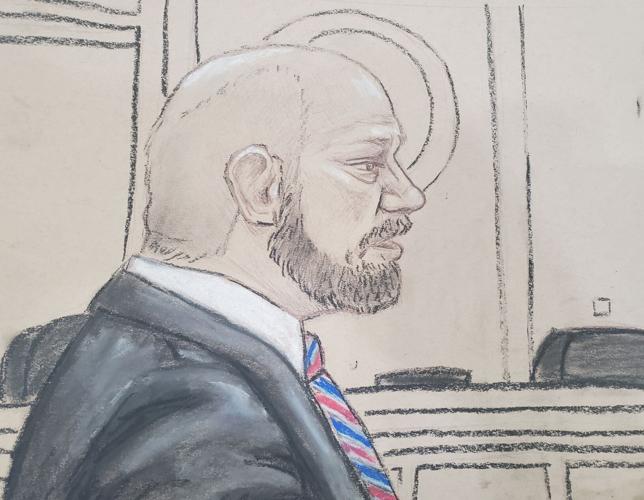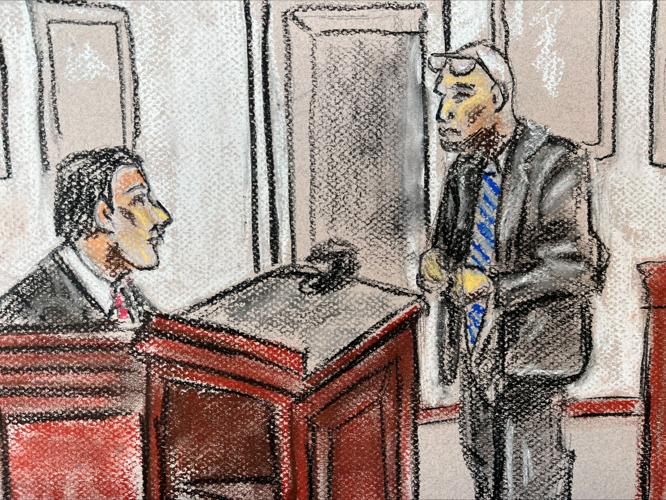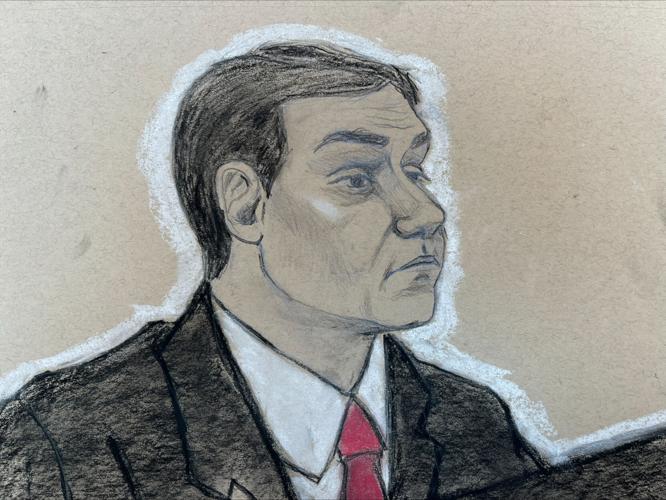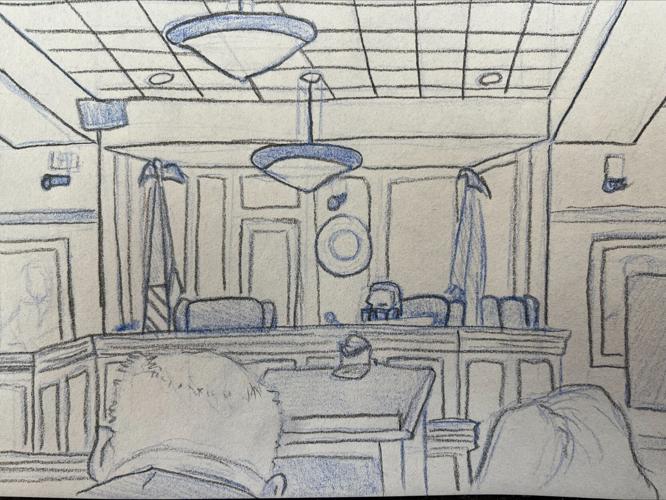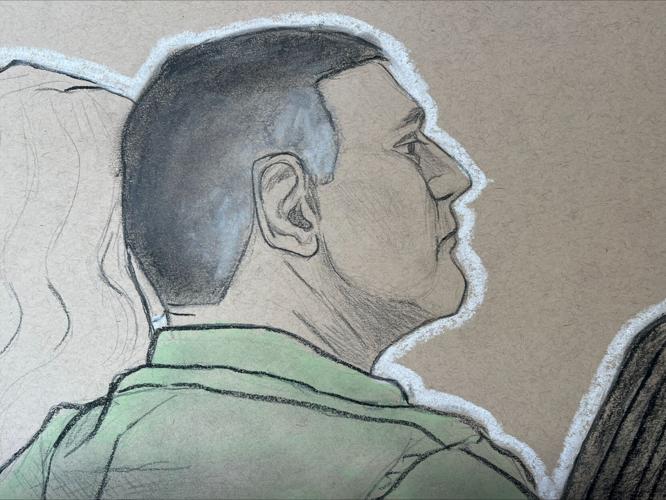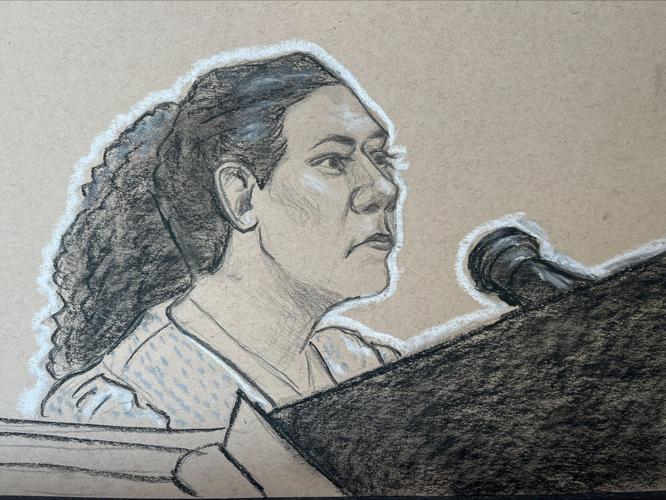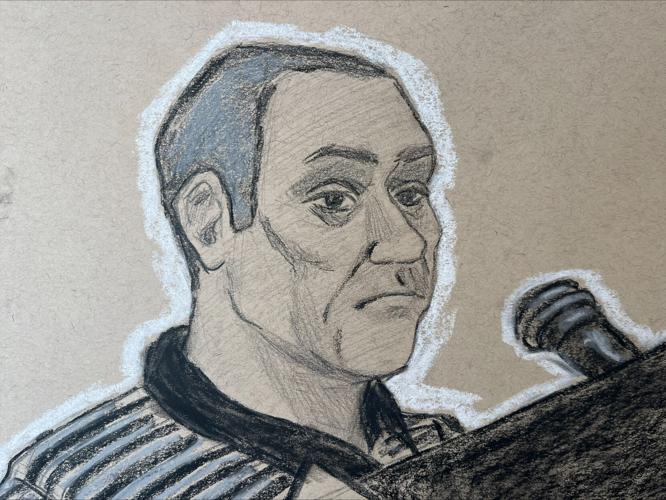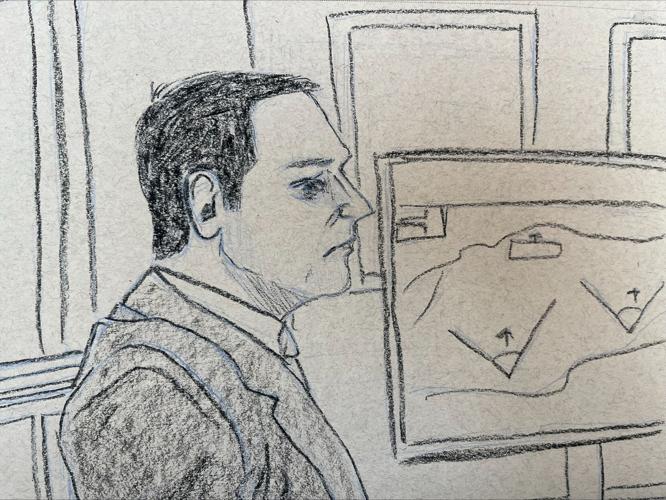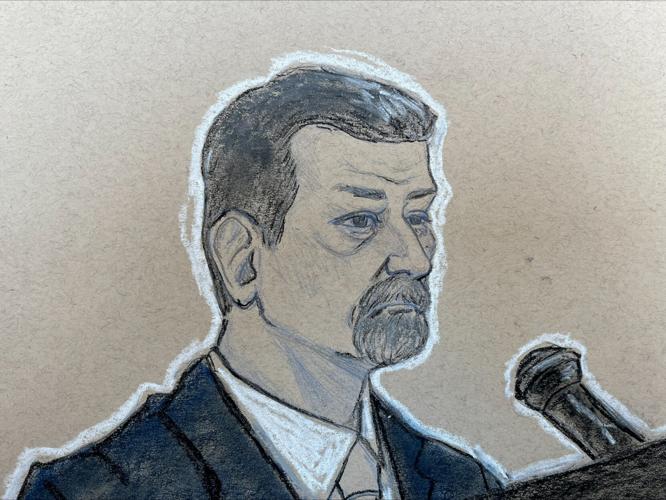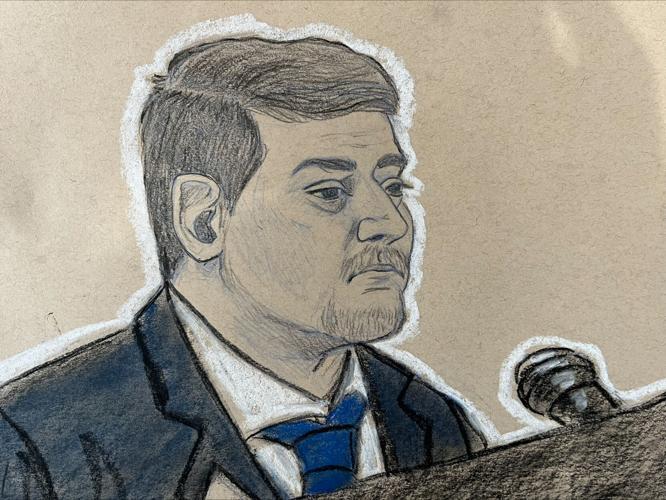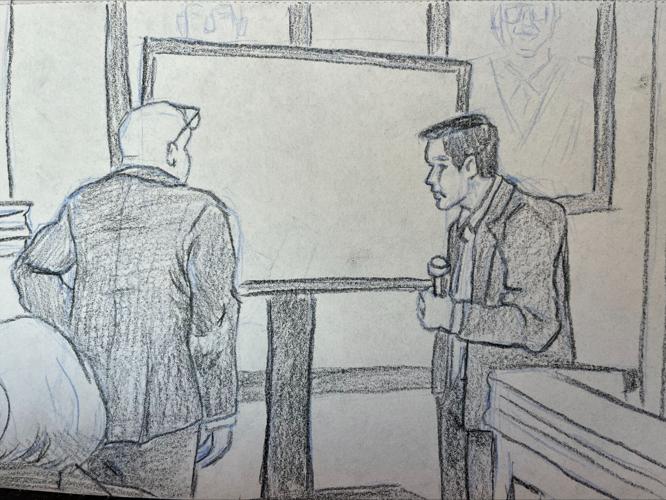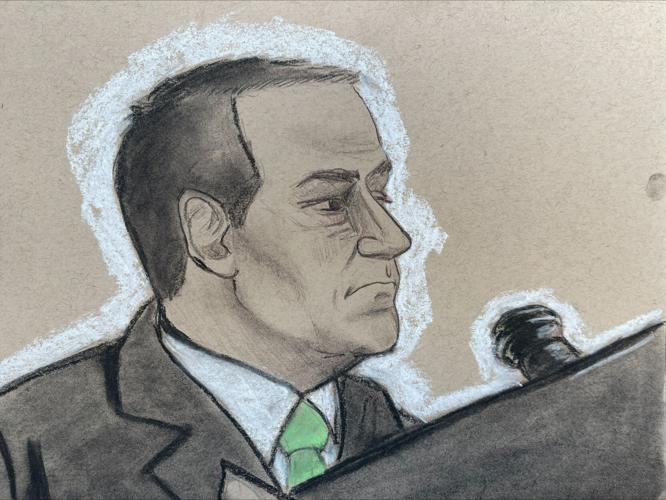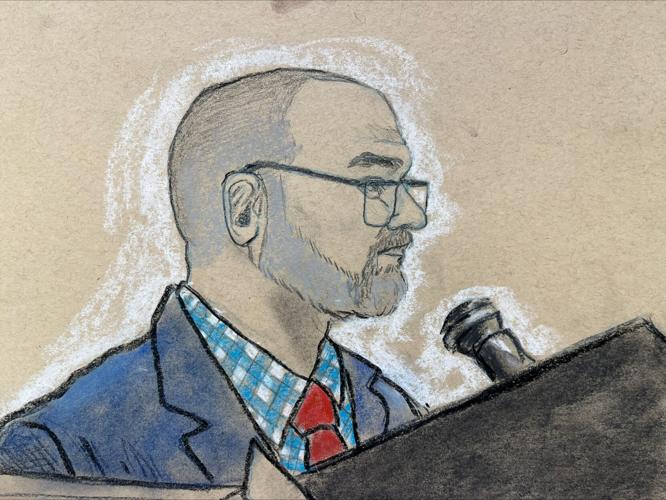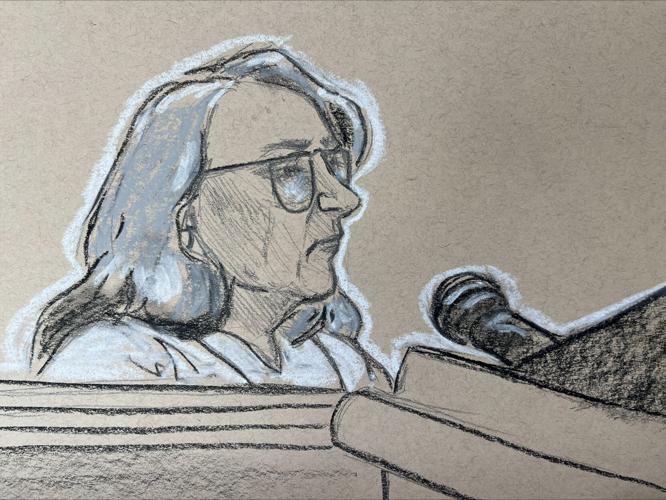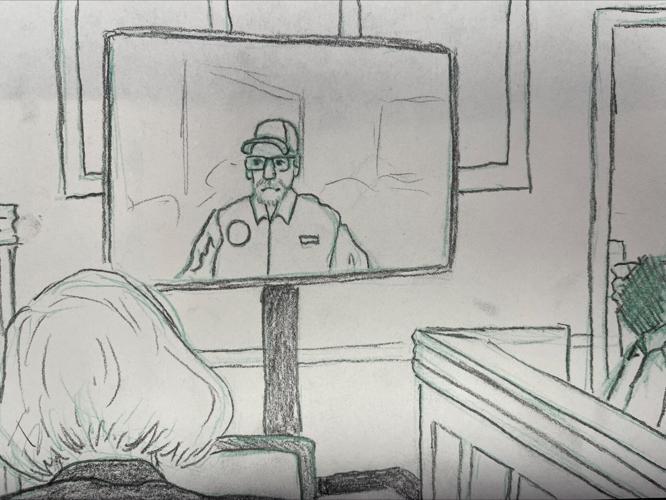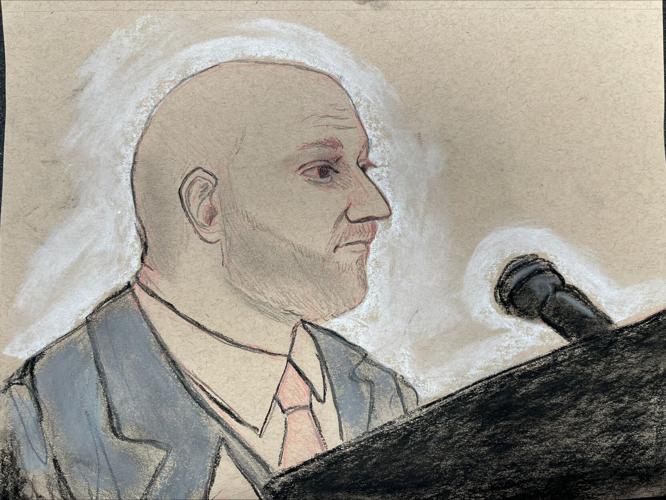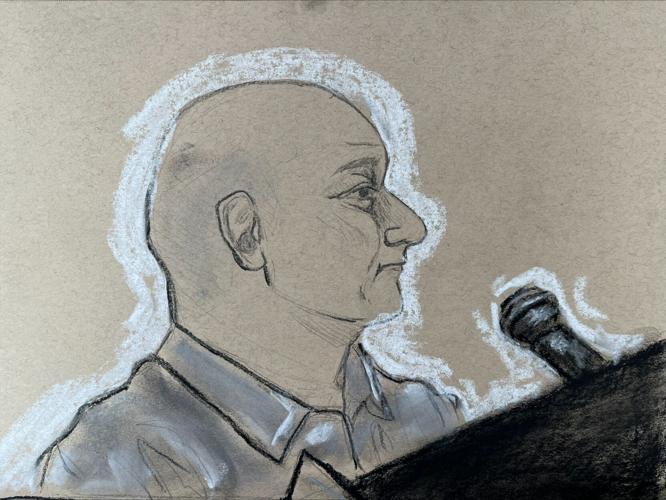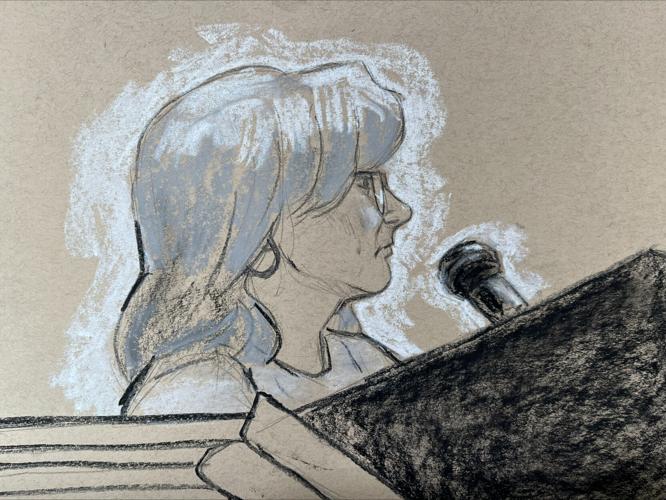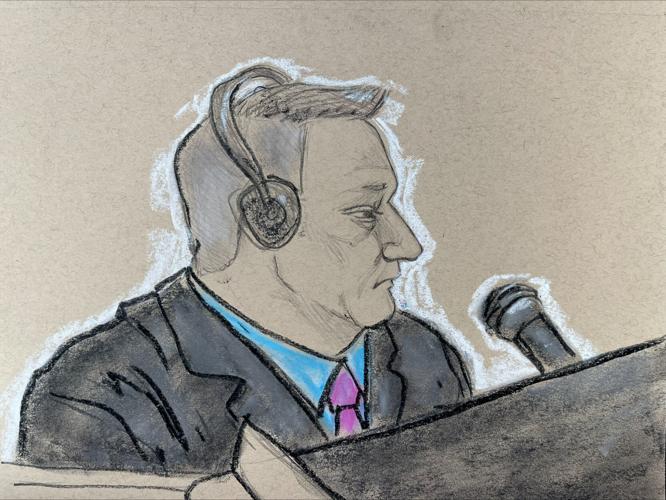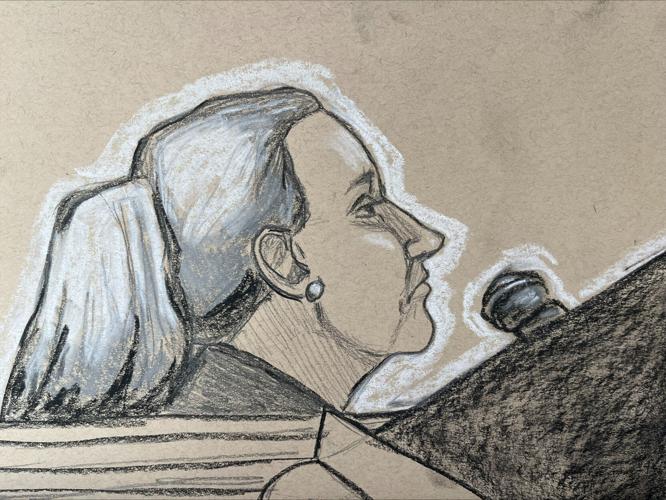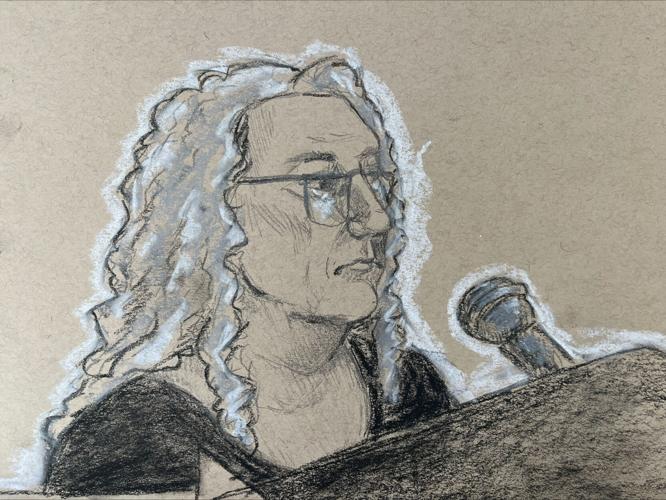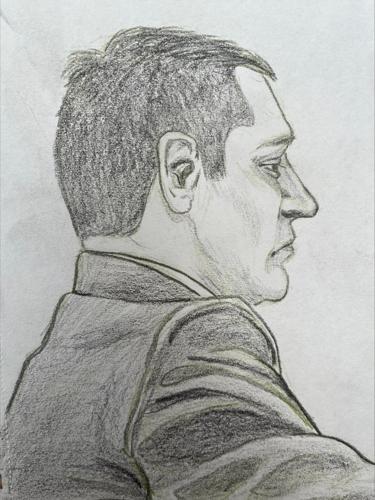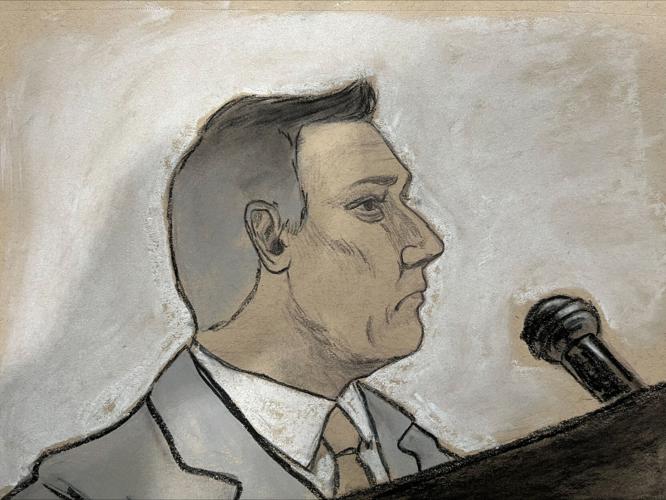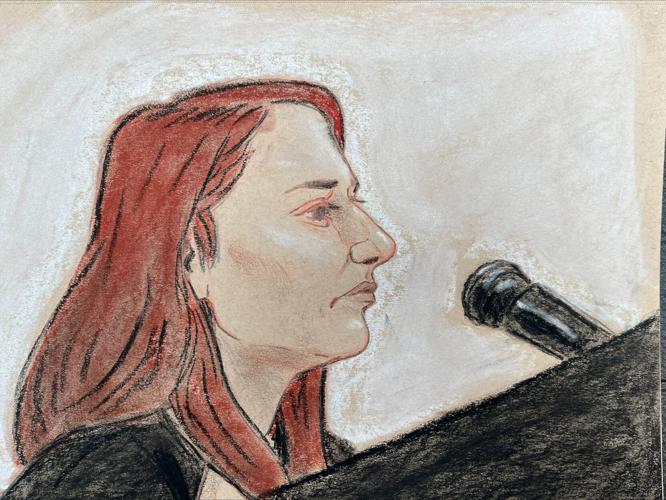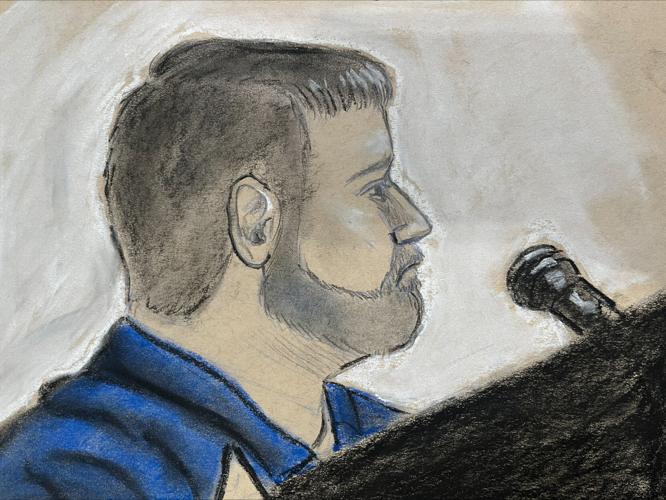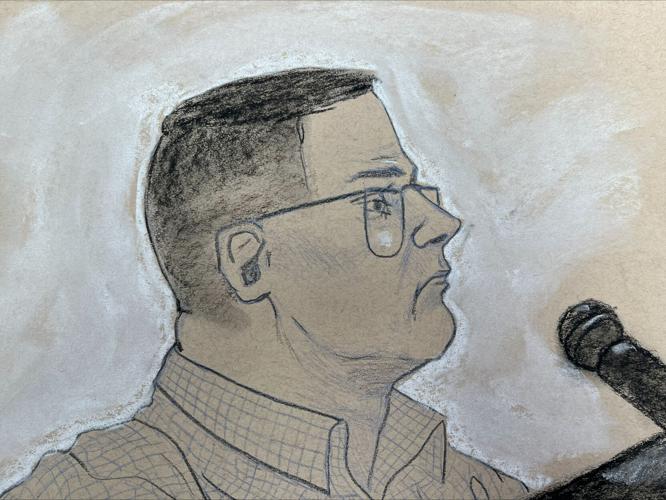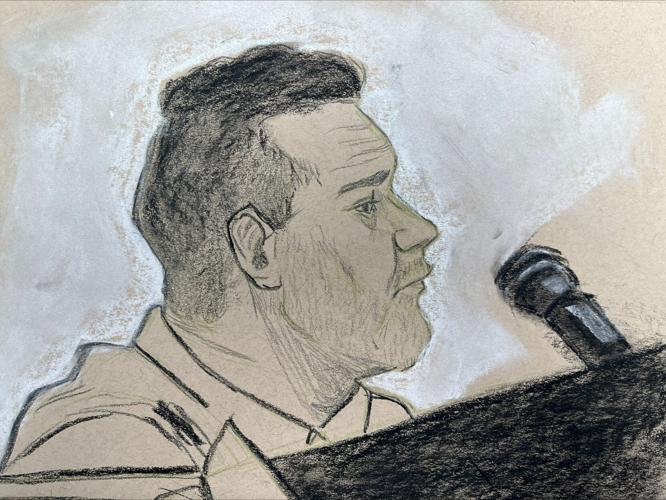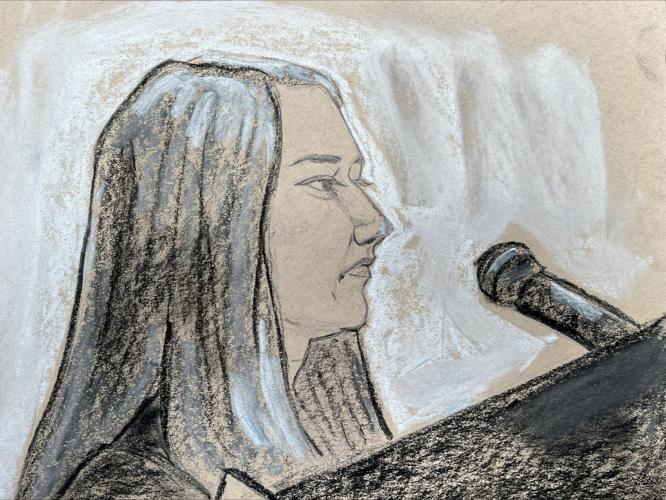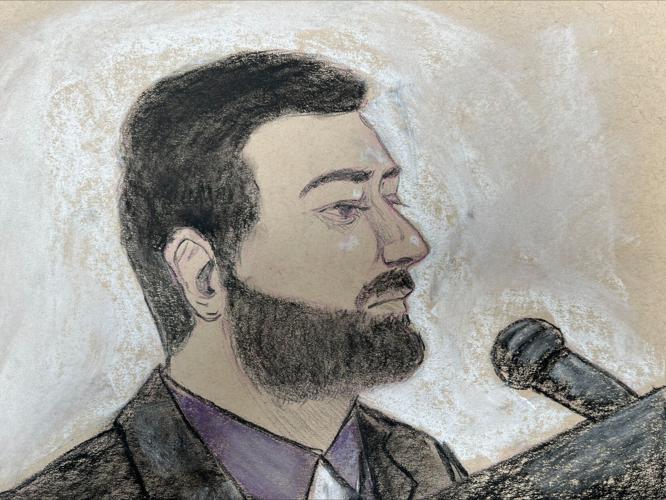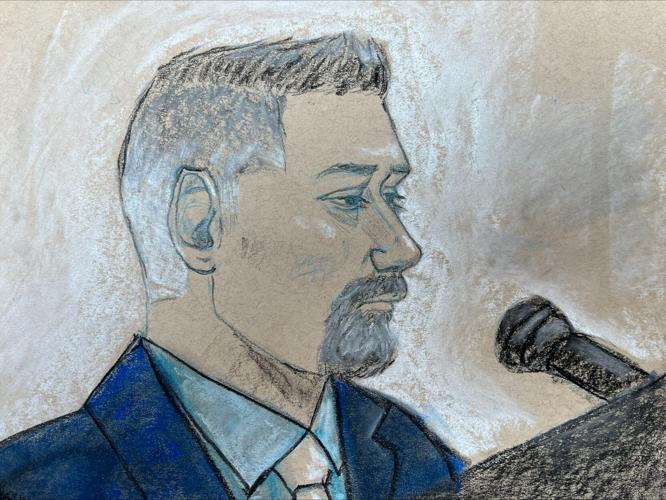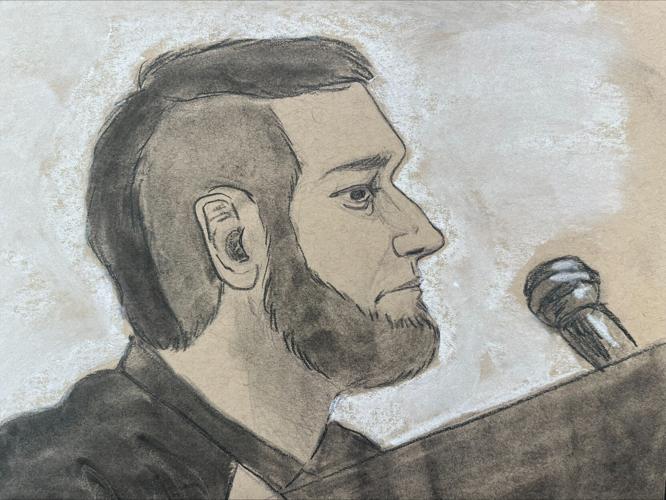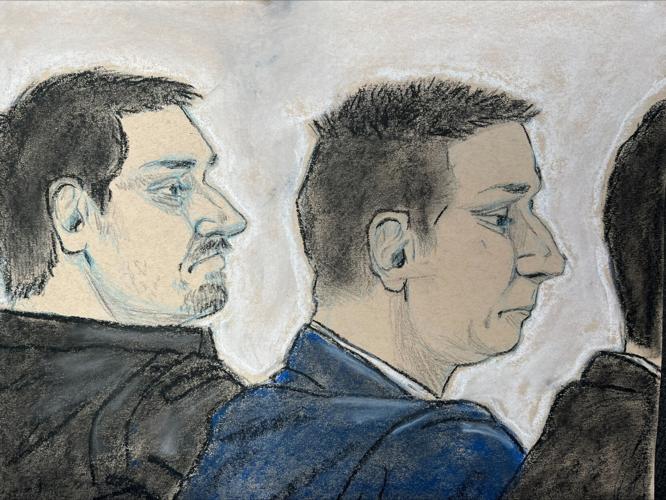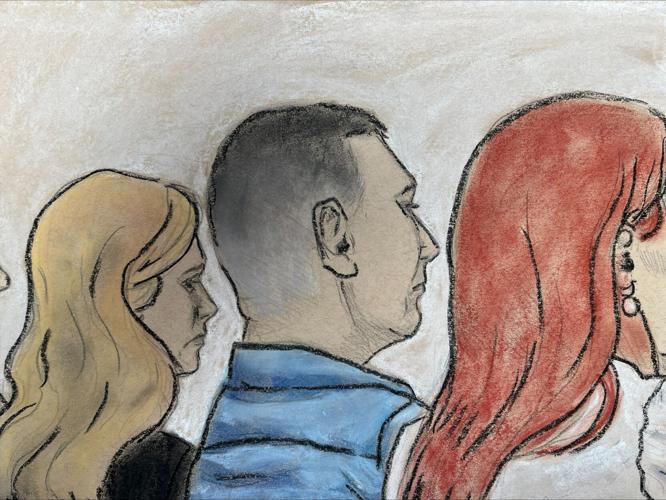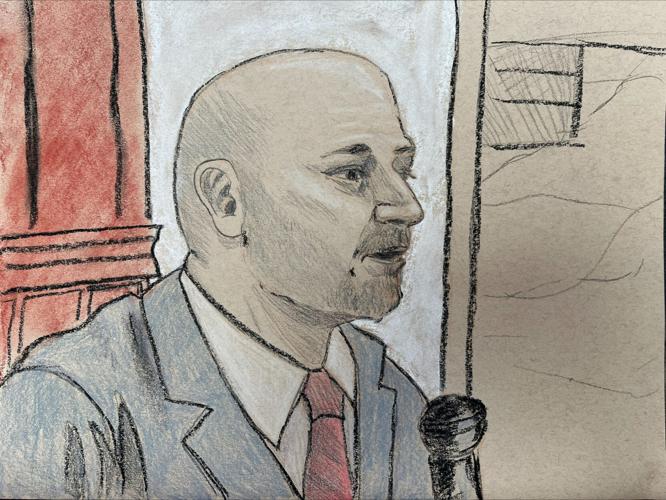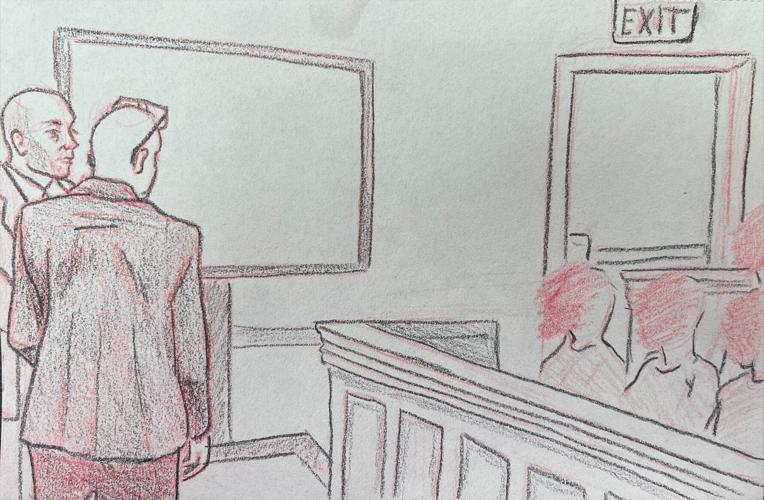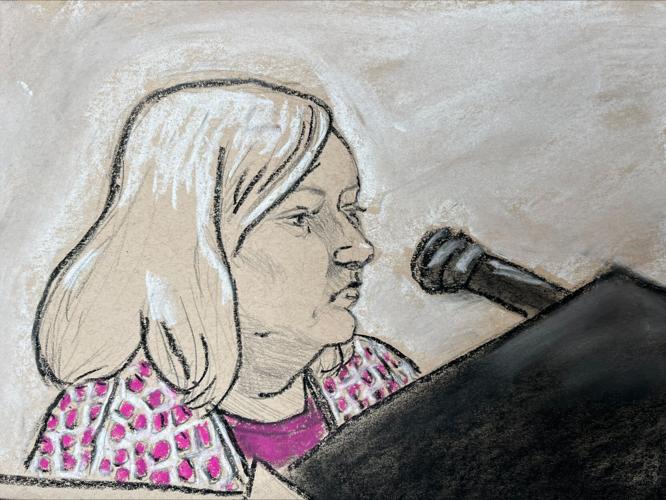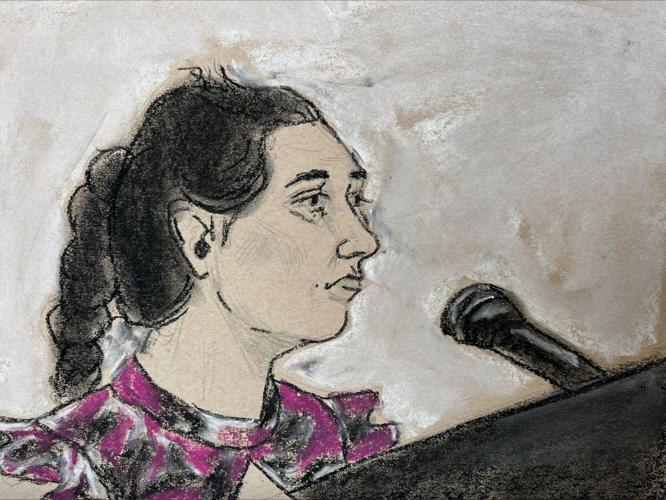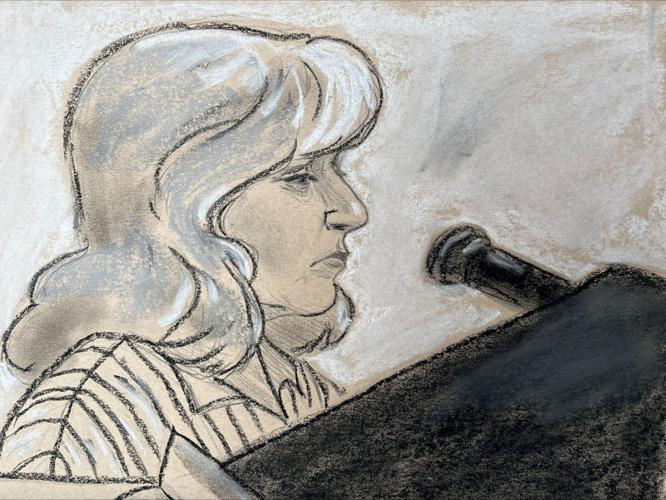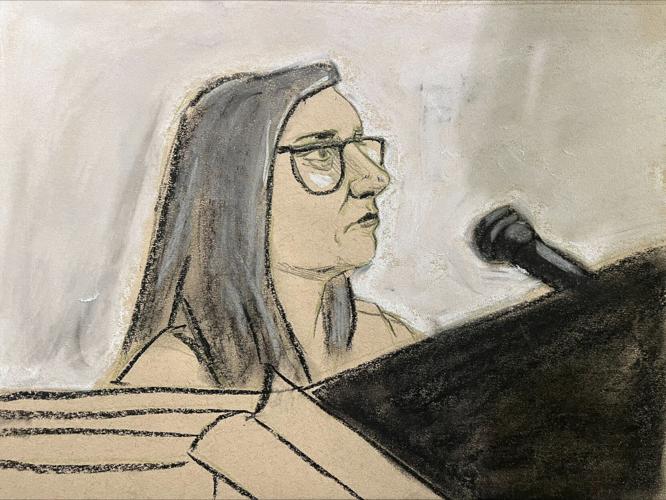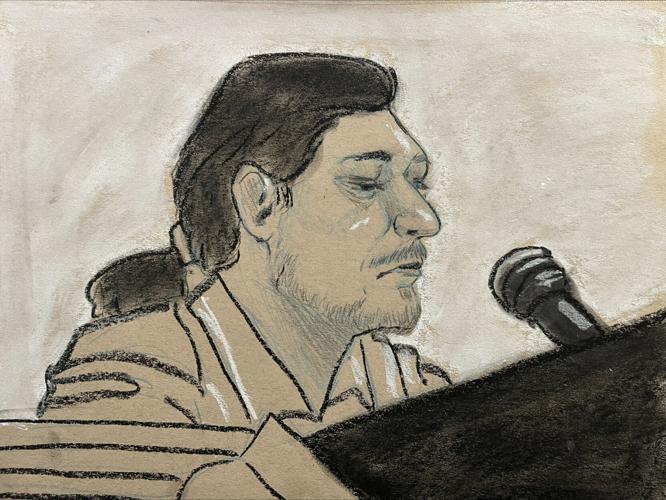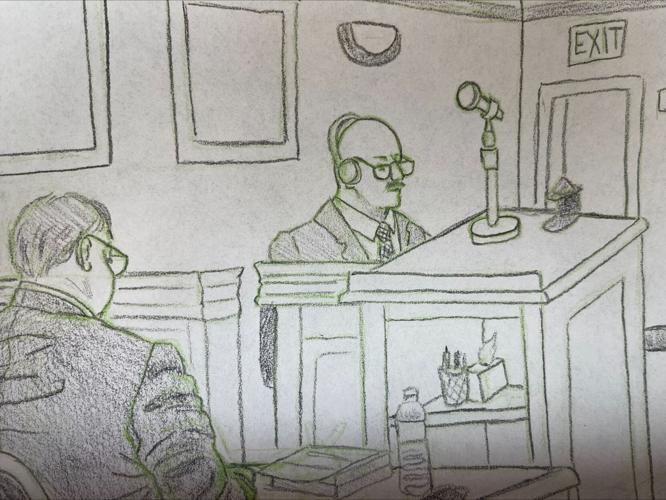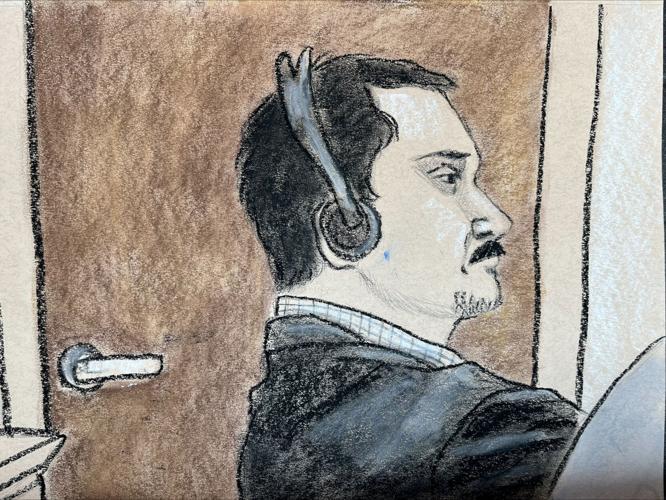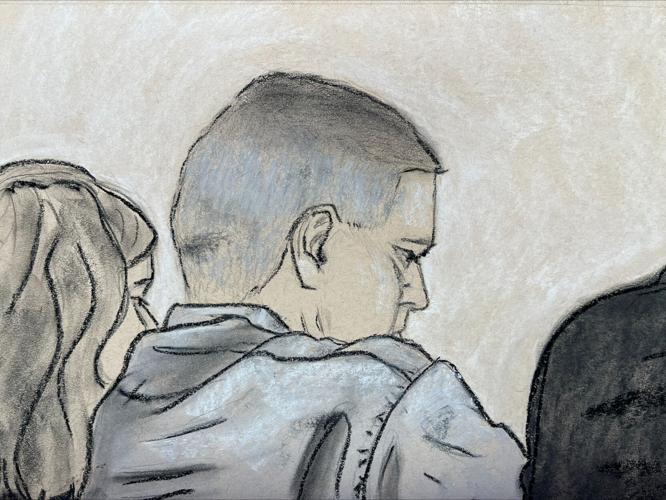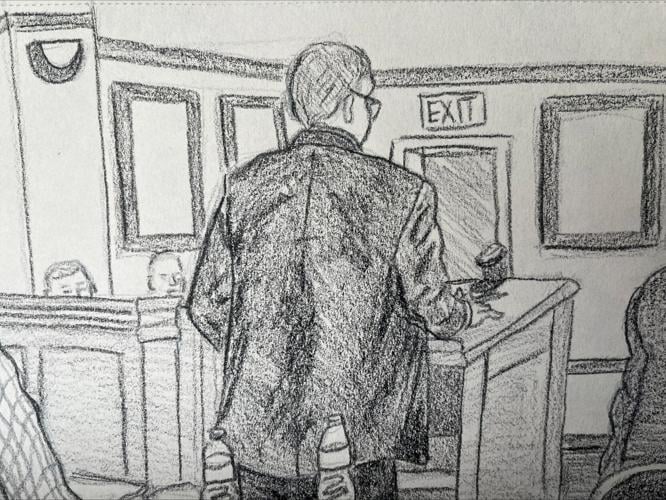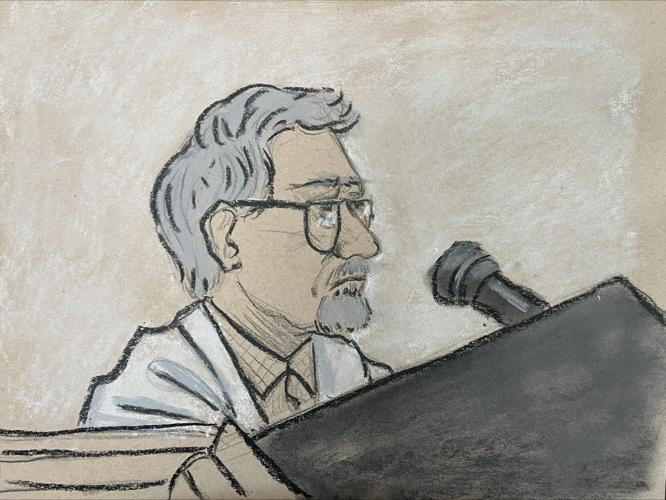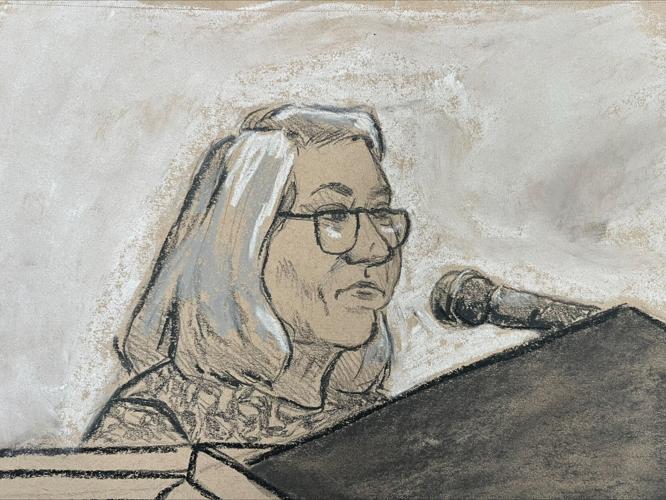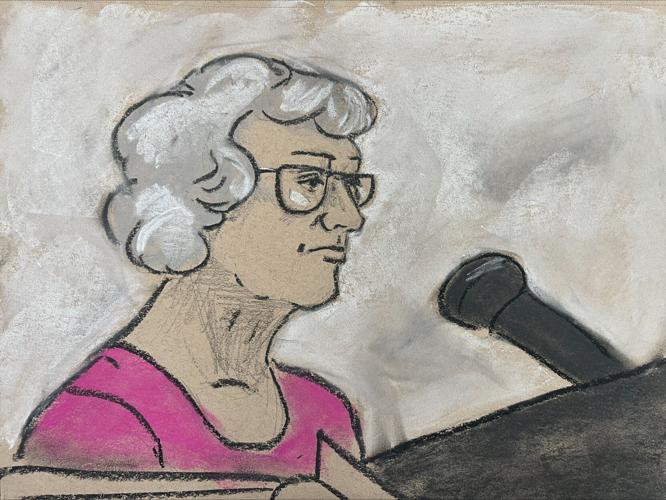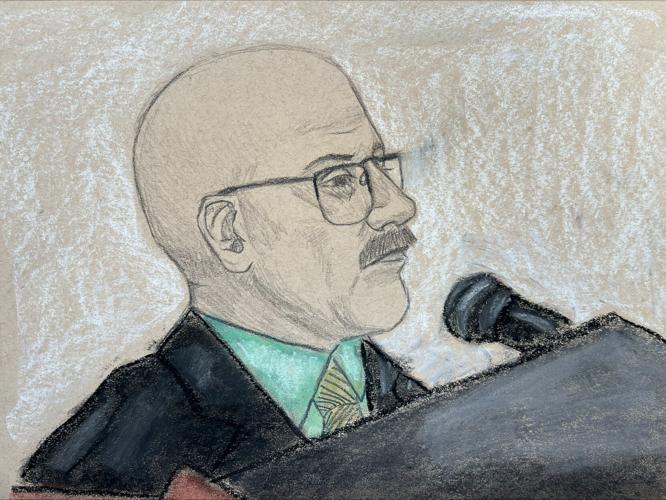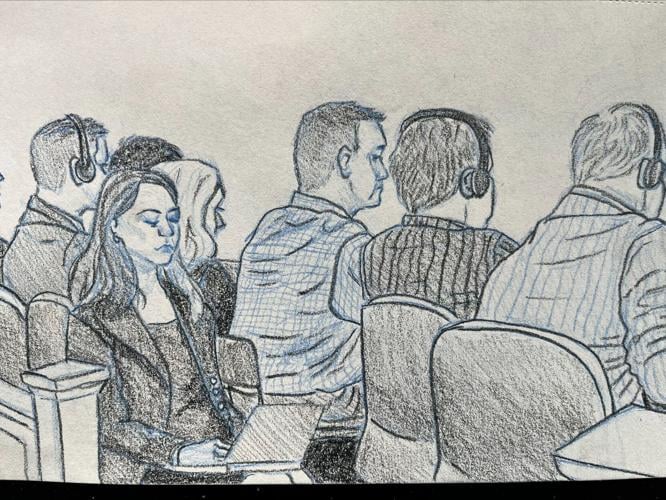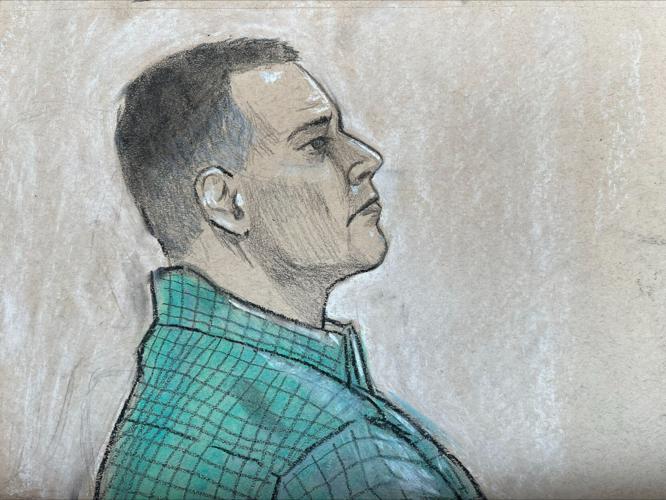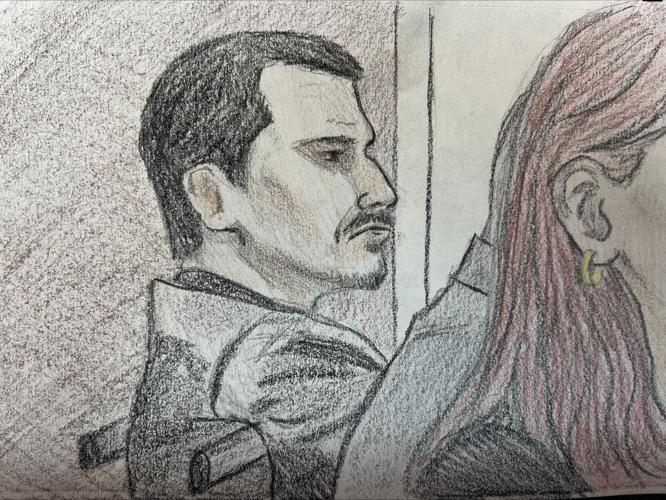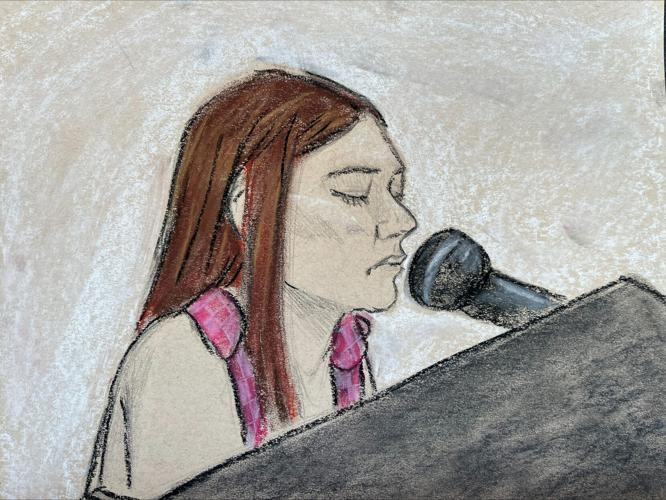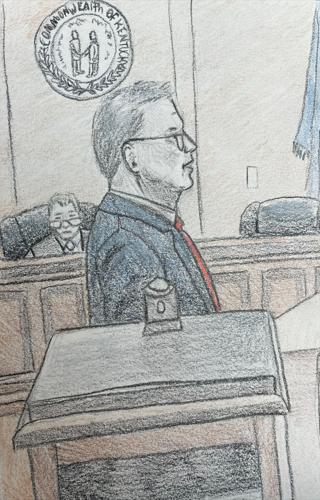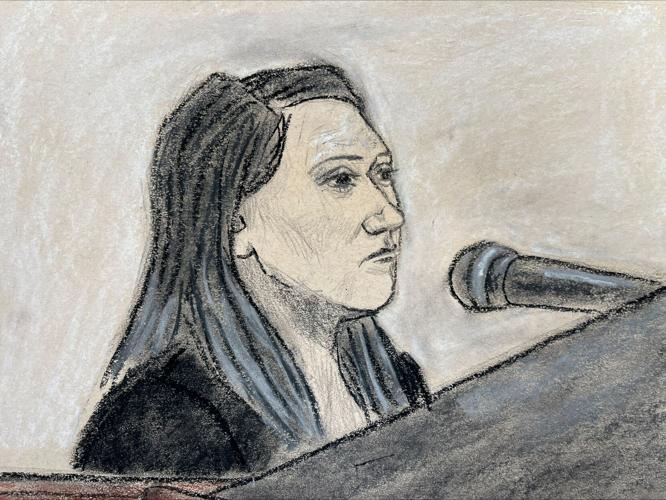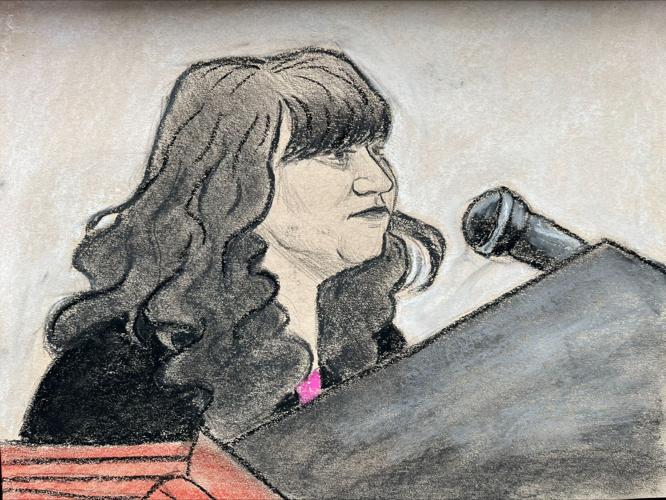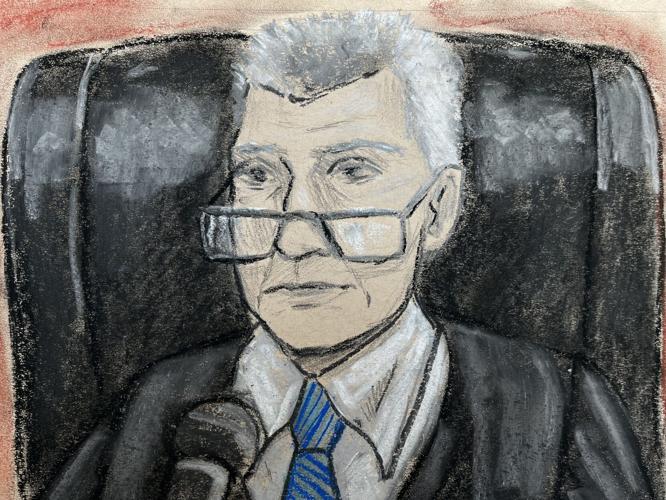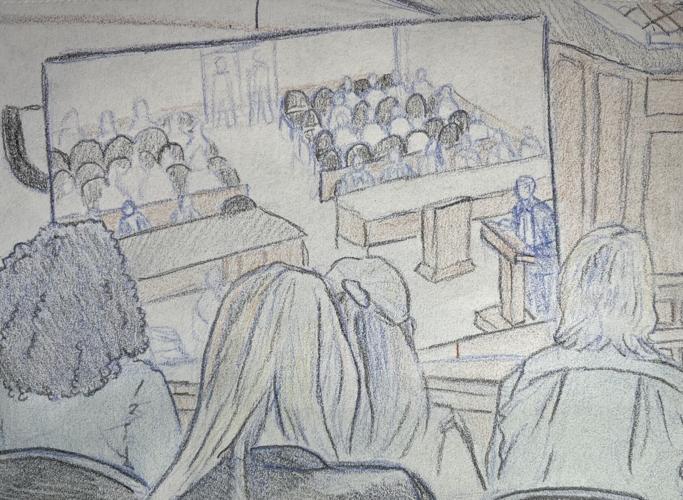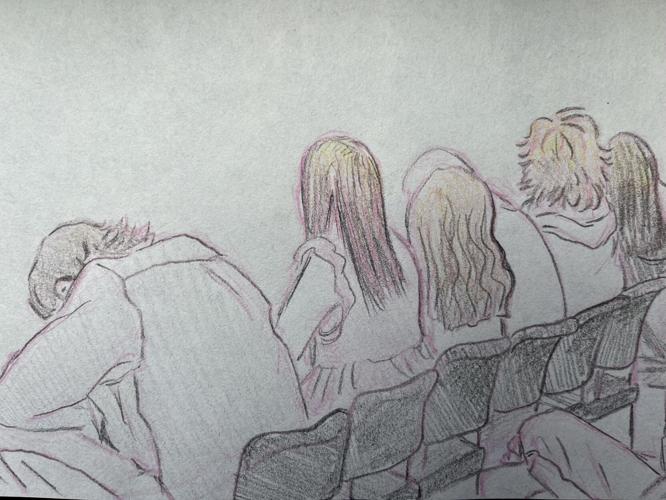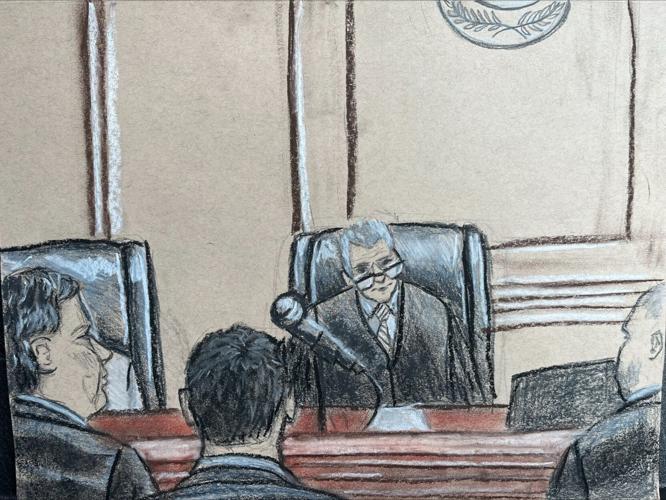BOWLING GREEN, Ky. (WDRB) -- The trial of Brooks Houck and Joseph Lawson in the Crystal Rogers murder case is in its second week in Bowling Green 10 years after the mother of five disappeared in Bardstown.
The first week of trial, which you can read about here, saw testimony from Rogers' friends and family members, the ex-girlfriend of Steve Lawson, Joseph Lawson's father, Bardstown business owners and a digital forensic expert.
This is the second trial in the Rogers murder case. Steve Lawson was convicted earlier this month of conspiracy to commit murder and tampering with physical evidence in the case.
Brooks Houck is charged with complicity to commit murder and tampering with physical evidence and faces up to 25 years to life in prison. Joseph Lawson is charged with conspiracy to commit murder and tampering with physical evidence, facing up to 25 years behind bars.
Below is a running blog of updates from the courtroom. Check back frequently as we report on testimony throughout the trial:
Defense rests its case
3:20 p.m. Thursday, July 3 — Marcus Green
The defense rested its case Thursday afternoon in the Crystal Rogers murder case, setting the stage for closing arguments Monday morning in Bowling Green.
For the second time this week, Judge Charles Simms III denied motions from both Brooks Houck and Joseph Lawson's attorneys for summary judgment, meaning the trial will continue. Simms said there is "sufficient evidence to send the case to the jury."
Court will resume at 9:15 a.m. EDT Monday, and the jury will arrive at 10 a.m. The defense will give its closing statement in the morning, with the prosecution following in the afternoon.
From there, the case will go to the jury for deliberation.
The final witness of the day was Rick Sanders, a former Kentucky State Police commissioner who now is the police chief of suburban Jeffersontown in Louisville Metro. Sanders was called as a rebuttal witness by prosecutor Shane Young, who asked if, in his decades of law enforcement experience, he has ever used or been trained in the Reid interrogation technique, which was frequently cited earlier in the day as the standard by defense witness Jeffrey Neuschatz, a cognitive psychologist.
Sanders said he had not, but "I've had great success" with other methods.
Earlier, Young cross-examined former detective Denver Butler about the lack of DNA evidence from Crystal Rogers found during searches of the Houck farm and other sites. Under questioning, Butler said it is "possible but highly unlikely" for no bodily fluids to be found at a murder scene.
It also was made public for the first time Thursday what investigators found in 2021 after digging at a house built by Brooks Houck's construction company. They found women's underwear with hairs under the driveway, along with clothes under a sidewalk there. However, Young said no DNA profile could be created — meaning it couldn't be determined whose DNA those items contained.
Former police detective details the many searches of Houck property
1:30 p.m. Thursday, July 3 — Marcus Green, Fallon Glick and Valerie Chinn
Before breaking for lunch, Brooks Houck's defense team called former Louisville police detective Denver Butler as an expert in police investigations.
Butler, who is not related to defense attorney Brian Butler, was asked to review various law enforcement searches from 2015-22, including a "very manpower intensive" search of a property near the Houck farm in 2016.
He repeatedly confirmed a lack of DNA and other evidence tied to Crystal Rogers.
Denver Butler did say hairs found in Rogers' car were not tested but should have been. The testing of her car also found no DNA belonging to either Steve or Joey Lawson, he said. Below is a list of the searches Denver Butler covered in his testimony:
- Crystal Rogers' car
- Found a hair in the driver's seat and a hair on the driver's side floorboard
- Neither were tested
- Found a hair in the driver's seat and a hair on the driver's side floorboard
- Brooks Houck's trunk and home
- No evidence was found
- Nick Houck's police cruiser
- No evidence was collected that showed a crime was committed
- Houck farm
- Searched July 6, 7 and 10 in 2015
- No evidence was found that showed a crime was committed
- Searched July 6, 7 and 10 in 2015
- White Buick LeSabre that once belonged to Anna Whitesides, Brooks Houck's grandmother
- Processed May 4, 2016
- No DNA from Rogers was found in the car
- A hair "similar" to Rogers' was found, but a lab was unable to get a DNA profile from it
- Processed May 4, 2016
- Whitesides Road
- No evidence was found
- Pulliam Ave. — Anna Whitesides' house
- No evidence was found
- Paschal Board Road
- Searched Aug. 30, 2016
- No blood found on front-loader
- Searched Aug. 30, 2016
- Houck farm
- Searched Aug. 30-31, 2016
- No evidence was found
- Searched Aug. 30-31, 2016
- Houck farm
- Searched Aug. 6-9, 2020 by the FBI
- No evidence was found
- Searched Aug. 6-9, 2020 by the FBI
- North Howard Street
- Searched Aug. 30, 2021
- Tore up driveway around the house and found a pair of women's underwear with hairs on it underneath
- The defense sand the DNA didn't match Rogers, though the prosecution said the lab was unable to get a DNA profile from it at all
- Tore up driveway around the house and found a pair of women's underwear with hairs on it underneath
- Searched Aug. 30, 2021
- Houck farm
- Searched Oct. 17-20, 2022
- No evidence was found
- Searched Oct. 17-20, 2022
Judge Charles Simms III called for lunch, with testimony to resume at 2:20 EDT.
Cognitive psychologist admits coerced statements to police can still be true
12 p.m. Thursday, July 3 — Marcus Green and Fallon Glick
Under questioning from prosecutor Shane Young, cognitive psychologist Jeffrey Neuschatz acknowledged that coerced statements can still be true and the interrogation techniques used by Kentucky State Police are legal.
Young also mentioned during his cross-examination of Neuschatz that Girdley and Heather Snellen testified to the grand jury in this case free or any coercion or pressure by investigators. A former girlfriend of Steve Lawson, Snellen, testified Friday that she was at Lawson's home in 2017 when she overheard Lawson and his son, Joseph, talking about "moving a body at the Houck farm."
Snellen was being investigated by Child Protective Services at the time, and, in a transcript of her interview with KSP provided in court Friday, one investigator threatened to charge her or have her child taken away.
"Your life is pretty good," one investigator told her. "It can stay that way, if you tell us everything you know."
Snellen finally left the interview after more than four hours of being grilled by KSP, and, when she got up to leave, a trooper got in her way and said "I don't want to have to take your little boy from you," according to the transcript.
Neuschatz said the interviews he watched in this case were "some of the most coercive interview tactics I've ever seen."
Referring to Girdley, Young said he was simply told "please tell the ladies and gentlemen of the jury the truth."
Expert calls police interrogation 'very coercive'
10:45 a.m. Thursday, July 3 — Marcus Green, Fallon Glick and Valerie Chinn
The first witness called by the defense Thursday was Jeffrey Neuschatz, a cognitive psychologist who specializes in memory issues and police interrogation.
Neuschatz testified that he reviewed 60 hours worth of interviews in the Crystal Roger case. Answering questions from defense attorney Brian Butler, Neuschatz picked apart Kentucky State Police's June 2023 interview of Charlie Girdley, saying there were 314 improper techniques used such as promises of leniency and attempts to manipulate Girdley by mentioning his family.
"It was very coercive," he said.
Among the problems he found with that interview were the length of Girdley's police interrogation. Girdley testified earlier in the trial Steve Lawson told him once Brooks Houck was looking to "get rid of his old lady." On cross-examination, Girdley admitted to changing his stories multiple times, lying to investigators and being repeatedly threatened by KSP troopers.
Under questioning from defense attorney Steve Schroering, who represents Houck, Girdley admitted he was on felony probation and on the run when he was picked up by U.S. Marshals on June 21, 2023. During that time, according to a transcript of an interview provided in court Monday, troopers promised to take care of him, promised to get him out of charges and, eventually, threatened him repeatedly and asked him leading questions trying to get different answers.
Girdley said he'd been awake for five or six days on meth when he was interviewed for more than four hours. Neuschatz said industry standards don't recommend anything that long, because it can lead false statements, fatigue, etc. He also took issue with detectives not accepting several versions of his account for where he was that night
Girdley told prosecutor Shane Young on Monday he's clean now and told the truth on the stand.
"What I've testified today is the truth," he testified.
Defense will likely rest its case before holiday weekend, judge says
4 p.m. Wednesday, July 2 — Marcus Green and Fallon Glick
Jurors were dismissed for the day shortly before 4 p.m. EDT following lengthy testimony and questioning of Adrian Lauf, a University of Louisville computer science professor and expert on cellphone data.
Lauf, the only defense witness called after a lunch break, faced a barrage of questions from prosecutor Shane Young, who sought to exploit a potential inaccuracy in cellphone data tied to Steve Lawson.
Young tried to show one questionable reading should raise questions about the entire data set, based on remarks Lauf made in a previous case he testified in. For his part, Lauf tried to explain the prior case had different factors that aren't applicable to the Rogers case.
Steve Lawson testified at his trial that Joseph Lawson drove Rogers' car, and his father picked him up when the vehicle had a flat tire, leaving it on the side of Bluegrass Parkway. But the jury is unable to consider that testimony.
Speaking hypothetically, Young asked Lauf if the cellphone data presented at trial was his data and he had admitted to moving a car on the Bluegrass Parkway, "Would you call me a liar?"
Defense attorney Brian Butler then interjected. The question wasn't answered.
Judge Charles Simms III said he expects the defense will conclude its case Thursday afternoon. With the Fourth of July holiday weekend looming, he said the trial would likely resume Monday with closing arguments before the jury begins its deliberations.
Cellphone analysis shows Steve Lawson wasn't on Bluegrass Parkway, UofL professor testifies
2:45 p.m. Wednesday, July 2 — Marcus Green and Fallon Glick
Adrian Lauf, a computer science and engineering professor at the University of Louisville, testified Wednesday afternoon that cellphone location data shows Steve Lawson wasn't in the area of the Bluegrass Parkway, where Crystal Rogers' car was found broken down with a flat tire the day after she disappeared.
However, Lawson, who was convicted earlier this month of conspiracy to commit murder and tampering with physical evidence in the case, admitted in that trial he was guilty of tampering with physical evidence for helping his son move Rogers' vehicle after she disappeared. Joseph Lawson drove Rogers' car, and his father picked him up when the vehicle had a flat tire, leaving it on the side of Bluegrass Parkway, he testified.
Before they left, Steve Lawson said he reached into Rogers' car and moved the driver's seat forward — because Rogers was short — and removed a miniature Louisville Slugger bat his son carried around regularly. At his son's urging, he called Brooks Houck around midnight and told him the job was done, Steve Lawson said.
Since he was tried separately, Steve Lawson's testimony won't be allowed to be shown to jurors in this trial.
Joseph Lawson's phone had no cellphone data, Lauf said.
Lauf also testified that Rogers' phone didn't have any location data, as some of that technology was relatively new and less developed in 2015.
Brooks Houck's sister takes the stand
12 p.m. Wednesday, July 2 — Marcus Green, Fallon Glick and Valerie Chinn
Rhonda McIlvoy, Brooks Houck's sister, testified Wednesday morning that there wasn't a hog farm on her mother's property in 2015. They had some little pink pigs in an enclosure, she said, a picture of which was shown to the jury. Earlier in the trial, one of Brooks Houck's former employees, Charlie Girdley, testified Joseph Lawson said he would feed Rogers to the hogs on the farm.
Much of the cross-examination of McIlvoy focused on a secret recording of her June 2016 grand jury testimony. In a 2023 hearing, prosecutor Shane Young accused McIlvoy, Nick Houck, Rosemary Houck — her brother and mother, respectively — and two other family members of secretly recording their grand jury testimony. It's a misdemeanor with a fine of up to $1,000 and a year in jail, but misdemeanors can only be prosecuted within one year of the crime, so the statute of limitations had long passed by 2023.
Asked on the stand Wednesday why she did it, McIlvoy said she "wanted to have proof of what I said and what I didn't say." She also said she was paranoid of the threats and accusations that had come with the investigation.
Asked by prosecutor Jim Lesousky if she kept the recording, McIlvoy said she believed she took it to her mother's house, where they were living in 2017 while they were building a house. They eventually moved into that new house in 2020, and she said she lost track of it over the years.
"In the mix of things, to be honest ... I don't know (where it is)," she said.
Lesousky said the recorder was found in the bedroom at Rosemary Houck's house and questioned McIlvoy as to how she could have lost it if it was so important with Rogers' case still under investigation.
In response to a jury question, McIlvoy said she also used a cellphone to record and said she thought she recorded more than just her grand jury testimony.
Defense attorney Brian Butler asked McIlvoy if she was ever part of any conspiracy to murder Rogers or if she aware of Brooks Houck's involvement in Rogers' disappearance. McIlvoy said no to both.
She said she and her family moved to North Carolina in the fall of 2015, wanting to get away from threats and accusations in the wake of Rogers' disappearance. While there, she said two detectives traveled to question her, the first time she'd been approached by investigators.
McIlvoy testified that she agreed to talk to them but became upset when they told her a member of Rogers' family alleged she babysat Rogers' and Brooks Houck's son, Eli, on July 3, 2015, the day Rogers went missing. McIlvoy said she was at the Kentucky Science Center in downtown Louisville with her husband and children that day and had provided police with a photo of them there.
She later testified her family didn't stay in Louisville that night and drove back to Bardstown sometime after 7 p.m. The total travel time, she estimated, would have taken a little more than an hour.
Defense says Joseph Lawson is 'collateral damage' in murder trial
10:30 a.m. Wednesday, July 2 — Marcus Green, Fallon Glick and Valerie Chinn
Defense attorney Kevin Coleman began his opening statement Wednesday morning by saying Joseph Lawson's life and the lives of witnesses in this case are an example of what the government is willing to sacrifice to prosecute Brooks Houck.
"Joey Lawson is the collateral damage in this case," Coleman said.
Coleman told the jury there's no forensic evidence that Lawson was in Rogers' car, emphasizing there was no DNA, trace evidence or fingerprints that connect Lawson to the car. Coleman also sought to put doubt into jurors' minds as to cellphone data presented by witnesses, arguing the tower data cited by the prosecution is far from clear cut.
The evidence heard so far in the trial has nothing to do with Lawson, Coleman said, telling the jury to stick to objective evidence.
"Use your common sense," Coleman said.
He finished his opening remarks by telling the jurors that once they hear all the evidence, "you'll conclude, as we have, that Joey Lawson is not guilty."
The first witness called by the defense Wednesday morning was Heath Farthing, a K-9 scent detection expert from Peru, Indiana. Farthing testified that the dog that was said to have made the positive detection of human remains on a car linked to the Houck family was improperly trained for that kind of work.
He said he believes dogs shouldn't be cross-trained to detect both live scents and human remains, as that dog was.
The defense used Farthing's testimony in an attempt to raise concerns about the work of Terry Benjamin — who, with his K-9 Ranger — was tasked by Detective Jamie Brooks with checking the car after it was sold by the Houck family.
Farthing went on to say trainers are required to keep the training records for their K-9s, and Benjamin testified earlier this week he lost Ranger's documentation.
A crux of prosecutor Shane Young's cross examination of Farthing dealt with the dual, or cross, training. Young sought to get Farthing, the defense witness, to acknowledge that a cross-trained K-9 can accurately identify human remains.
"I'm not saying it's impossible," Farthing admitted on cross-examination.
A second defense witness, Porter Hendrix of Vine Grove, gave an account of a raccoon hunting competition on the night Rogers went missing. On Monday, Ryan Cecil and Daniel Donohue testified they were hunting near the Houck farm on the night of July 3, 2015 and saw a white Buick parked on the road. Cecil said he and two other men were out on Paschal Ballard Road on what was a rainy night.
But Hendrix testified Wednesday that he didn't see any other vehicles on the road and didn't recall being separated from anyone in the hunting party.
Prosecution rests its case after calling about 40 witnesses
3:30 p.m. Tuesday, July 1 — Jason Riley
After calling about 40 witnesses over five days of testimony, the prosecution in the Crystal Rogers murder trial rested its case Tuesday afternoon. Among the last few witnesses were several people who said they heard with Joseph or Steve Lawson discuss their involvement in Rogers' disappearance.
The jury was sent home Tuesday afternoon, after which Judge Charles Simms III denied motions from both Brooks Houck and Joseph Lawson's attorneys for summary judgment, meaning the trial will continue.
At 9:30 a.m. EDT, Joseph Lawson's attorneys, Kevin Coleman and Bobby Boyd, will give their opening statement, which was deferred earlier in the trial. Then the defense for Houck will begin presenting its case.
Joseph Lawson told grandmother Steve Lawson killed Crystal Rogers, she testified
2:30 p.m. Tuesday, July 1 — Jason Riley and Fallon Glick
Rebecca Greer, who dated and was then married to Steve Lawson, said she overheard a conversation in 2019 between Joseph Lawson and her daughter, who were dating at the time and had a daughter together. Greer testified that she overheard them talking about moving a car for $50,000. When Greer confronted Joseph Lawson about the conversation a few months later, he told her it was true "but if you want to know any details, you have to ask Steve."
Also, Greer testified that she saw a physical fight between Steve Lawson and Joseph Lawson during which Joseph Lawson said "you keep on and I'm going to let everyone know about this car and all your involvement."
Barbara Colter, Joseph Lawson's grandmother, then testified that he came to her house in 2022 while he was on drugs and said "Grandma, there's something I need to tell you." Colter said Joseph Lawson sat down and told her Steve Lawson killed Rogers, though he didn't provide any details.
The judge told the jury that testimony can only be used against Joseph Lawson, not Brooks Houck.
Colter testified Tuesday that Joseph Lawson was too high to be driving and that he and his father had a "toxic" relationship. She provided all this information to police in June 2024.
One of the final witnesses of the day was Stacie Cranmer, who worked for Houck in 2015. Cranmer testified in Steve Lawson's trial earlier this month that he she saw Houck and Steve Lawson driving around and later asked Steve Lawson what they were doing.
"'I got to take care of something,'" Cranmer said he told her. "'I got to take care of this girl. She has five kids and she's not doing real good.'"
Cranmer asked if that meant he was helping get her in rehab.
"No, I wish that was the case," Cranmer recalled Lawson saying.
Cranmer gave a similar statement in 2015 to police in Nelson County, but mentioned that Lawson said Rogers was on meth.
Back in court to testify Tuesday, Cranmer said she called police right after Rogers went missing, but no one called her back. She went to police in person in October but said they didn't take her seriously and told her Steve Lawson "full of crap."
The jury was released for the day around 2:30 EDT, the prosecution and defense will take up motions with the judge before court adjourns for the day.
Digital forensic expert shows what Crystal Rogers did on her phone the night she disappeared
Tuesday, July 1 — Fallon Glick
The prosecution called Joshua Hickman, a digital forensic expert from North Carolina, to the stand Tuesday morning. Hickman was asked by prosecutors to analyze Crystal Rogers' phone to determine whether it was near a WiFi network July 3. Here's a breakdown of what Hickman found, per his testimony:
- July 3:
- 7:39 p.m.: Cookie Jam app in use for 2 minutes
- 7:48 p.m.: Facebook app in use
- 7:52 p.m.: Cookie Jam app in use
- 7:52 p.m.: Facebook message sent to device: "OK sounds good"
- 7:52 p.m.: Back to Cookie Jam app for 14 minutes
- 8:06 p.m.: Sugar Smash: Book of Life video game app in use for 15 minutes
- 8:55 p.m.: Sugar Smash: Book of Life video game app in use for 28 minutes
- 9:23 p.m.: Device loses power and shuts off
- 11:57 p.m.: Device starts to power on
- 11:57 p.m.: Someone manually shuts it off
- July 6:
- 10:45 a.m.: Police turn phone back on
Hickman said he also received Brooks Houck's phone and was asked by the prosecution to extract location data and review call logs and gaming app use from July 3-4. Hickman said the phone connected to an unnamed WiFi network from 6-8 p.m. July 3 and then again from 12-2 a.m. July 4.
The jury is on lunch break until 1:45 p.m. EDT.
K-9 alerted detective to human remains in trunk of car formerly owned by Houck family, new testimony reveals
10:30 a.m. Tuesday, July 1 — Jason Riley and Fallon Glick
On the sixth day of testimony in the Crystal Rogers murder trial, a K-9 dog handler testified that the dog alerted to human remains in the back of a car owned by the Houck family.
Terry Benjamin's testimony was played in court Tuesday from a previously recorded video deposition. He said he met Detective Jamie Brooks on May 20, 2016, at a National Rifle Association event in Louisville while with his dog "Ranger."
Det. Brooks asked if Benjamin and his K-9 dog would accompany him to a search the next day. Without being told what he was looking for, Benjamin said he and Ranger were led into a small parking lot where about 10 vehicles were being held.
Ranger, according to Benjamin's testimony, went through the lot before focusing on two cars, including a white Buick LeSabre, which had been owned by Brooks Houck' grandmother, Anna Whitesides.
On Monday, Det. Brooks testified that Whitesides and her grandson, Nick Houck, Brooks Houck's brother, sold the car at a Louisville dealership May 2, 2016. Pictures show Whitesides and Nick Houck at the dealership that day.
The car became a key part of the prosecution's narrative this week after Det. Brooks testified that a hair located in the trunk was "similar in color and characteristics" to strands of hair in Rogers' hair brush. Investigators determined the hair didn't belong to Whitesides. A DNA test didn't match a profile for Rogers.
The two cars Ranger zeroed in on were parked next to each other, and Ranger eventually settled on the Buick, Benjamin said.
After going to the passenger side, Ranger went back to the rear of the Buick and sat down, which Benjamin said was his alert that he'd found human remains.
Under cross-examination during the recording deposition, defense attorney Steve Schroering, who represents Brooks Houck, pointed out that Benjamin worked for Lone Star Search & Rescue, a part-time, volunteer ministry organization dedicated to saving lives of missing people. This was the first time Benjamin had testified in a criminal case, and he acknowledged he'd lost all the documents regarding Ranger's training.
Schroering also pointed out that the car had been poured over by investigators before Ranger searched. Ranger, who Benjamin said was certified in 2015 for human remains detection, had done about 300 searches but dealt mostly with finding live human beings.
Also, Schroering noted Benjamin's final report stated Ranger alerted to the passenger rear side of the car. Still, Benjamin testified that Ranger alerted to the passenger rear side of the trunk, saying he sat and pressed his nose against it.
Ryan Cecil and Daniel Donohue testified Monday in court they went coon hunting the night of July 3, 2015, near the Houck farm and saw a white Buick parked on the road.
Also, Owen McKinney, who was the manager of a Dollar General store in Hardin County in 2015, testified earlier Monday that he left work around 10:15 p.m. July 3 and saw a maroon Chevrolet Impala — Rogers' car — and a white car on the Bluegrass Parkway on his way home. When he returned to work around 7 a.m. July 4, Rogers' car was still there.
Hair found in Houck family car didn't have DNA profile at FBI lab, reports showed
5:30 p.m. Monday, June 30 — Jason Riley
Keith Stivers, a sales manager at Sternburg Automotive, said Nick Houck attempted to sell the white Buick there first. Stivers said Houck told him he wanted to find a car for his grandmother but found it strange Houck didn't want to give the dealership access to the car before the trade-in so an appraisal could be done.
In cross-examination of Det. Brooks on Monday afternoon, defense attorney Steve Schroering pointed out that several hairs and other evidence were found in the trunk of the white Buick. In addition, the hair Det. Brooks said was "similar" to Rogers' was sent to an FBI lab, and agents there couldn't find a DNA profile, lab reports showed.
Det. Brooks also told the defense a search of the car showed no fingerprints besides Whitesides' eight months after Rogers' disappeared. The prosecution then noted Nick Houck's DNA wasn't found in the car despite the fact he drove with Whitesides to the dealership to sell it.
A cadaver dog search of the car was conducted, but the results remain unknown. At a National Rifle Association show at the fairgrounds in Louisville on May 20, 2016, Det. Brooks said he saw someone he knew who worked with dogs part-time in Texas. The next day, he took the man to the car at the Louisville Metro Police impound lot to do a search with the dog. The search wasn't recorded by police, and no results have been reported so far during trial.
The jury was sent home for the day around 5:30 p.m.
Detective says car on Bluegrass Parkway may have belonged to Brooks Houck's grandmother
4:30 p.m. Monday, June 30 — Jason Riley and Fallon Glick
Ryan Cecil and Daniel Donohue testified Monday in court they went coon hunting the night of July 3, 2015, near the Houck farm and saw a white Buick parked on the road. Cecil said he and two other men were out on Paschal Ballard Road on what was a rainy night.
Also, Owen McKinney, who was the manager of a Dollar General store in Hardin County in 2015, testified earlier Monday that he left work around 10:15 p.m. July 3 and saw a maroon Chevrolet Impala — Rogers' car — and a white car on the Bluegrass Parkway on his way home. When he returned to work around 7 a.m. July 4, Rogers' car was still there.
Jamie Brooks, a detective with the Internal Revenue Service, then took the stand and said a white Buick similar to the one seen by Cecil, Donohue and McKinney was owned by Brooks Houck's grandmother, Anna Whitesides.
Cecil and Donohue reported seeing the car to police July 10, 2015, but the information laid dormant until April 28, 2016, when Tommy Ballard, Rogers' father, posted on Facebook asking about a white Buick. On May 1, detectives got a call from Ballard and then obtained a search warrant for Whitesides' home.
When they arrived, "the white Buick had been sold," Det. Brooks said, adding that another car in the garage had a temporary tag.
He said the Buick was sold at a Louisville dealership May 2, 2016, and pictures show Whitesides and Brooks Houck's brother, Nick, at the dealership that day.
Police obtained the car from the lot and took it to the Louisville Metro Police forensic lab. A hair located in the trunk was "similar in color and characteristics" to strands of hair in Rogers' hair brush, Det. Brooks said. Investigators determined the hair didn't belong to Whitesides, though it's unclear whether it was tested for DNA.
Investigators also brought in a cadaver dog, but the dog's findings have yet to be released in court.
On cross-examination, Donohue and Cecil said they didn't hear any gunshots, screams or anything else out of the ordinary that night.
Det. Brooks is still on the stand at the time of this writing.
Key witness Monday claims he's telling the truth despite allegations of heavy drug use, changing story
3 p.m. Monday, June 30 — Jason Riley and Fallon Glick
Charlie Girdley said he'd been awake for five or six days on meth when he was interviewed for more than four hours by Kentucky State Police troopers about Rogers' disappearance.
Girdley testified Steve Lawson told him once Houck was looking to "get rid of his old lady." On cross-examination, Girdley admitted to changing his stories multiple times, lying to investigators and being repeatedly threatened by KSP troopers.
He ended up getting a 90-day sentence for violating his probation, with work release, instead of going back to prison. He told a Nelson County grand jury he was never promised anything by investigators but hinted at a different story in the transcript of an interview with KSP after serving his sentence.
"I probably wouldn't have gotten the 90-day sentence without you all," he told KSP, according to a transcript.
Girdley said he'd been out drinking and doing drugs before that initial four-hour KSP interview and hadn't slept for five or six days. He told prosecutor Shane Young on Monday he's clean now and, despite what the transcript shows were possibly coercive interview tactics by KSP, telling the truth on the stand.
"I told the truth," he said on the stand. "What I've testified today is the truth."
Defense again damages witness who offered compelling testimony against Brooks Houck
1:15 p.m. Monday, June 30 — Jason Riley, Fallon Glick and Valerie Chinn
As has been the case repeatedly in the first five days of the trial, what seemed like explosive testimony against Brooks Houck was again Monday damaged on cross-examination.
Charlie Girdley testified Steve Lawson told him once Houck was looking to "get rid of his old lady." On cross-examination, Girdley admitted to changing his stories multiple times, lying to investigators and being repeatedly threatened by Kentucky State Police troopers.
Under questioning from defense attorney Steve Schroering, who represents Houck, Girdley admitted he was on felony probation and on the run when he was picked up by U.S. Marshals on June 21, 2023.
He said he was taken to see KSP troopers, who questioned him for more than four hours. During that time, according to a transcript of an interview provided in court Monday, troopers promised to take care of him, promised to get him out of charges and, eventually, threatened him repeatedly and asked him leading questions trying to get different answers.
Girdley told a Nelson County grand jury he was never promised anything by investigators. He ended up getting a 90-day sentence for violating his probation, with work release, instead of going back to prison.
When Girdley's timelines were incorrect about what police believed happened the day Rogers disappeared, the troopers pushed him further and took several smoke breaks with him, which weren't recorded.
"We're trying to lead you into it, trying to save you," a trooper told Girdley during the interrogation.
"I'm trying to cooperate with you all. I really am," Girdley told the troopers.
At one point, according to the transcript, Girdley told troopers Houck said something to him about picking up a car. Girdley acknowledged on cross-examination Monday that wasn't true.
"Brooks has never asked me to do anything like that," he said.
At one point, according to the transcript, one trooper screamed at Girdley, who screamed back "You all are trying to make them think I had something to do with this."
"You can spend the rest of you live in the pen or you can walk out of here," one trooper told him, according to the transcript.
In another instance, as troopers continued to probe, Girdley asked if they could "give him a hint."
The back and forth went on for hours. Girdley testified a short time later in front of a Nelson County grand jury that Joseph Lawson called him and said he broke down on the Bluegrass Parkway and wanted Girdley to bring him a trailer and come pick him up. Girdley said he didn't go because he'd been drinking.
Girdley also met with the FBI, who he said were professional, and told them he knew nothing about the case.
Defense attorneys have repeated throughout the trial that investigators — especially KSP troopers — lied, threatened and coerced witnesses to get the testimony they needed.
The jury is on a lunch break, after which the defense will continue cross-examination of Girdley.
Man testifies Steve Lawson told him Brooks Houck wanted someone to 'get rid of his old lady'
12 p.m. Monday, June 30 — Jason Riley, Fallon Glick and Valerie Chinn
Charlie Girdley, who worked for Brooks Houck, testified Monday that Steve Lawson told him once Houck was looking to "get rid of his old lady." Girdley said he looked up, laughed at Lawson and walked off.
Girdley said in court he went drinking with Joseph Lawson on July 3, 2015, the night Crystal Rogers disappeared. They left, he said, and met up with Steve Lawson to get his paycheck. Lawson gave his son his keys so Joseph Lawson could work on Rogers' car, putting new brakes and rotors on it.
Later that night, Girdley said Joseph Lawson called him and said he broke down on the Bluegrass Parkway and wanted Girdley to bring him a trailer and come pick him up. Girdley said he didn't go because he'd been drinking. He did not know what vehicle Lawson was driving.
At some point, Girdley said Joseph Lawson said he'd bury Rogers' car with a skid steer, so it'd never be found. So far, there's been no context presented to the jury about this comment. The timeline of the comment is unclear.
Melissa Dover, an intelligence analyst with the Elizabethtown Police Department, took the stand Monday morning and laid out an exhaustive schedule of phone calls and text messages between the suspects in the case. Below is a short synopsis of the calls and texts she laid out on the stand:
- July 3:
- 11:06 p.m.: Joseph Lawson called Steve Lawson — unanswered
- 11:07 p.m.: Joseph Lawson called Tammy Lawson — unanswered
- 11:54 p.m.: Joseph Lawson called Steve Lawson — unanswered
- 11:55 p.m.: Joseph Lawson called Tammy Lawson — unanswered
- 11:58 p.m.: Joseph Lawson called Tammy Lawson — unanswered
- July 4
- 12:04 a.m.: Joseph Lawson called Steve Lawson — 2 minutes and 57 seconds
- 12:07 a.m.: Steve Lawson called Brooks Houck — 15 seconds
- 12:43 a.m.: Steve Lawson to Joseph Lawson — 1 minute and 15 seconds
- 1:08 a.m.: Tammy Lawson to Steve Lawson — 3 minutes and 42 seconds
Owen McKinney, who was the manager of a Dollar General store in Hardin County in 2015, also testified Monday that he left work around 10:15 p.m. July 3 and saw a maroon Chevrolet Impala — Rogers' car — and a white car on the Bluegrass Parkway on this way home. When he returned to work around 7 a.m. July 4, Rogers' car was still there.
McKinney's testimony mirrors that of William Gunther, a former Lowe's employee who testified Friday that he got off work around 10 p.m. July 3 and took the Bluegrass Parkway home, as he regularly did. He said he noticed Rogers' car on the right shoulder with the flashers on and no one in or around it.
Gunther said he saw the same car two days later with police surrounding it.
Brooks Houck's brother left home for 24 hours the day Crystal Rogers disappeared, his ex-girlfriend testifies
10:30 a.m. Monday, June 30 — Jason Riley, Fallon Glick and Valerie Chinn
On day five of the Crystal Rogers murder trial, a former girlfriend of Brooks Houck's brother, Nick, testified that Nick Houck left his home early the morning of July 3, 2015, and she didn't see him again for about 24 hours.
Amber Bowman testified Monday that she and Nick Houck were supposed to move into a new home that morning, but, instead, he told her he was going to help Brooks Houck on a rental property. The two argued about this decision, Bowman said, but she said she then spent most of that day moving with her father's help.
Bowman testified she called Nick Houck 15 times between 11:43 a.m. July 3 and 10:40 a.m. July 4, and each call went to voicemail. She said he still wasn't there when she woke up the next morning.
"He had never not come home at all before," Bowman said on the stand.
Bowman said when she finally saw Nick Houck on July 4, he told her he was "working at the house," though it's unclear if he meant their new house or somewhere else.
Nick Houck, who was a Bardstown Police Department officer at the time of Rogers' disappearance, has been referenced several times already during the trial and was called an "unindicted co-conspirator" by the prosecution. He called Brooks Houck during the July 8 interview with Detective Jon Snow and warned him about continuing to talk to police.
Nick Houck was fired from the Bardstown Police Department in October 2015 for interfering with the investigation. And prosecutor Shane Young told a judge in October 2023 that Nick Houck used a fake name to sell a gun to investigators that may have been used to kill Tommy Ballard, Rogers' father.
On cross-examination, defense attorney Brian Butler, who represents Brooks Houck, pointed out that Bowman had said it was normal for him to be gone frequently at night, working on his own rental properties or as a police officer and that he often came home late. Bowman acknowledged that was true.
Bowman testified she went to their new home three times July 3 and never saw Nick Houck there. She did, however, find his phone there, which appeared to be off, she said.
Butler noted Bowman said in her 2016 testimony in front of a Nelson County grand jury there were tools all over the new house that day, though she said it was unclear what, if any, work had been done. Butler also said Bowman told the grand jury she assumed Nick Houck was mad at her, because they'd been fighting, and he was avoiding her calls.
On July 4, once Nick Houck returned home, he and Bowman began moving into the new house and went to a fireworks show that night. She said he was wearing a T-shirt and shorts, and there was nothing unusual about his appearance or clothing that day. But she again pointed out he had never before, as long as she'd known him, turned his phone off for 24 hours.
Related Stories:
Defense for Brooks Houck shows text message he sent to Crystal Rogers after she disappeared
Prosecution in Crystal Rogers murder trial tells jury Brooks Houck's brother, mother were involved
Prosecution: Crystal Rogers murder trial is circumstantial case, a 'no body homicide'
Copyright 2025 WDRB Media. All Rights Reserved.
